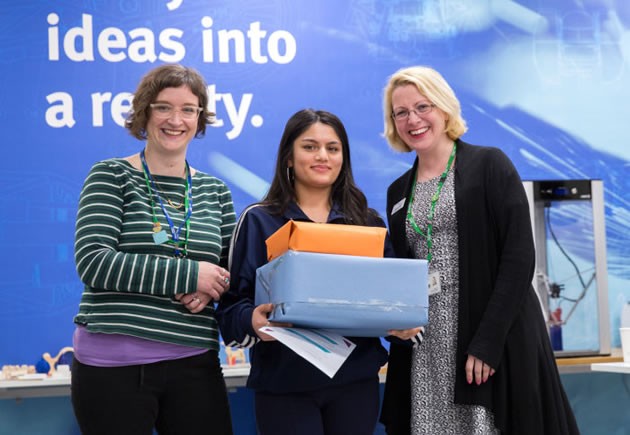White City Youngsters Showcase Their Inventions
Local schools participate in Imperial’s Maker Challenge

Maddena Hadafmand from Phoenix Academy wins first price. Picture: © Imperial College London
Based at the Reach Out Makerspace in The Invention Rooms at Imperial's White City Campus, the Maker Challenge encourages young people from the local community to get hands-on by creating their own prototype products and gadgets.
The 12 week programme is open to 14-18 years-olds from schools in the White City area and runs throughout the year, with programmes during each school term and in the summer holidays.
Through these sessions they gain a range of skills from hands-on use of 3D printers and laser cutters, to product development, team-building, and presentation and communication skills to help turn their innovative ideas into reality.
These skills are then put to the test as each project group assembles a prototype ahead of the final showcase event.
At the final, held on Tuesday 27 March, the winning prize was awarded to Maddena Hadafmand from Phoenix Academy who designed the Lumi Lamp, a nightlight which could monitor breathing and movement to sense when a person falls asleep, and automatically switch off when a state of deep sleep has been achieved.
She said: "I was inspired to develop the Lumi Lamp because I struggle to sleep without in complete darkness, but I know it’s not good to leave a light on all night. That made me think about whether I could design a lamp that would know when you fall asleep and turn itself off."
"The Maker Challenge has been fantastic. As it runs after school you might expect to find it tiring, but it’s so fun that I always arrived enthusiastic and excited to get going."
"I love engineering, and the way it makes you look at things in different ways to solve problems. This is just the first step for me."
Hanaa Daoudi, a pupil at Westminster Academy, received second prize at the final for ‘Luxon’ - an intricate LED lantern.
Muhammad Abdul Kabeer, from Phoenix Academy, won third prize for designing Shabag – a bag that can charge portable devices while keeping them safe and dry in wet weather.
A special prize for the most resourceful participant was won by Prince Hussain, also from the Westminster Academy, who invented an eco-friendly device called Harness that could be installed in drainpipes. It would use the kinetic energy created by water running down the pipes during rainfall to charge a mobile phone.
Located just a two-minute walk from White City underground station, The Invention Rooms is a pioneering space where people from all ages and backgrounds can work together to develop ideas into breakthrough prototypes. Here the community can join the Imperial community for a range of interactive events, activities and programmes to share in the wonder of science, making and discovery.
The Invention Rooms and Reach Out Makerspace programmes are supported by The Mohn Westlake Foundation, The Berkeley Foundation, Garfield Weston Foundation, The Elsevier Foundation and the Higher Education Funding Council for England (HEFCE).
April 3, 2018